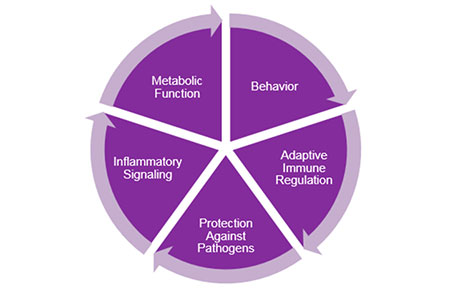 A growing number of scientists are investigating the role of our microbiome in the development of and protection from disease. One area of particular interest is recovery from injury and infection.
A growing number of scientists are investigating the role of our microbiome in the development of and protection from disease. One area of particular interest is recovery from injury and infection. Recent publications examine the relationship between the microbiome and HIV infection (Wei Yang JS, 2017), harnessing microbiome targeted therapies to reduce post-operative complications (Kasatpibal N, 2017), and the impact of environmental toxins on increasing antimicrobial resistant genes in the gut (Stedtfeld RD, 2017).
Taconic Biosciences hosted a series of microbiome symposia where several prominent researchers presented their findings on the role of the microbiome in infection and injury.
Presentations of Note
- Dr. Thomas Griffith, from University of Minnesota, gave a talk centered on Sepsis and the Microbiome. He discussed how the classic theory of sepsis is that "our response makes the disease," how immunosuppression plays a pivotal role in sepsis-related mortality, and the protective capacity of segmented filamentous bacteria.
- Kristina A. Kigerl, from The Ohio State University, presented Gut Dysbiosis Impairs Recovery after Spinal Cord Injury. She reviewed how antibiotics impaired recovery and intensified lesions after spinal cord injury, whereas probiotics improved recovery and increased lactic acid-producing bacteria.
- Jhansi Leslie, from University of Michigan, presented C. difficile and the Microbiome: Pathogenesis and Protection. She examined the cycle of Clostridium difficile infection, and how low-toxigenic strains of C. difficile protect from colonization of highly virulent strains.
- In her presentation, Deciphering the Biofilm-Macrophage Interactome: Targeting Polarization in Chronic Wounds, Mary Cloud B. Ammons, from Montana State University, discussed how chronic wounds result from an inability of the host immune system to overcome the bioburden from wound colonizing bacterial biofilms.















.jpg)

.jpg)
.jpg)
.jpg)
.jpg)





.jpg)


.jpg)
.jpg)

.jpg)


.jpg)





.jpg)

.jpg)




